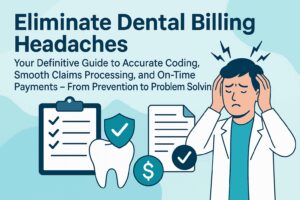
Improving Patient Communication in Dental Practices: The Key to Success

It is easy for clinicians and their team members to get caught up in the day-to-day routine. However, one crucial aspect that should never be overlooked is patient communication. Building strong connections with patients not only leads to better retention rates but also boosts productivity and ultimately contributes to the success of the practice. In this article, we will explore some valuable tips on how to improve patient communication in dental practices, ensuring that the focus remains on delivering exceptional care and fostering lasting relationships.
Building Rapport: The Foundation of Effective Communication
Many dentists prefer to keep their heads down and focus solely on the task at hand when treating patients. However, taking the time to build rapport can make a significant difference in patient satisfaction and loyalty. Stepping out of your comfort zone and engaging in conversations with patients can help create a friendly and welcoming atmosphere. Asking about their families, work lives, and oral health goals demonstrates genuine interest and shows that you care about their overall well-being. This simple act of building rapport can foster trust and loyalty, making patients feel more connected to the practice.
Encouraging Questions: Empowering Patients in Their Treatment Decisions
Patients often have questions after receiving treatment recommendations but may hesitate to ask them. It is essential to create an environment where patients feel comfortable expressing their concerns and seeking clarification. By asking patients open-ended questions such as how they feel about the treatment recommendation and how it aligns with their overall oral health goals, you can encourage them to share their thoughts. Actively listening and addressing their questions and concerns will help patients make informed decisions about their treatment, leading to higher acceptance rates and a stronger trust in your recommendations.
Active Listening: Valuing Patient Complaints and Feedback
When a patient raises an issue or complaint, it is crucial to listen attentively and take their feedback seriously. Avoid dismissing their concerns or attributing them to a bad mood. Instead, thank the patient for bringing the issue to your attention and express your commitment to finding a solution promptly. By actively listening and understanding the patient’s perspective, you demonstrate empathy and reinforce the patient’s trust in your ability to address their needs. This approach not only helps retain patients but also provides an opportunity for practice improvement.
Education: Empowering Patients with Knowledge
Taking the time to educate patients about their oral health and available treatment options can significantly impact their understanding and engagement. Engage in conversations about their oral health, discussing how they can improve it and the consequences of not pursuing recommended treatments. Utilize visual aids such as brochures, intraoral camera images, radiographs, and videos to enhance patient education. By providing comprehensive information and answering their questions, patients will feel more confident in their treatment decisions and develop a deeper connection with the practice.
Efficient Communication: Making Time for Patients
In a busy dental practice, it is common for appointments to run behind schedule, potentially leaving patients feeling neglected. However, effective communication involves acknowledging and respecting the patient’s time. Be upfront with patients about any delays as soon as they arrive, providing an expected wait time to manage their expectations. Actively involve patients in the decision-making process by asking if they are comfortable waiting or if they would prefer to reschedule. This simple act of communication demonstrates mindfulness and respect for the patient’s time, ultimately enhancing their overall experience.
Person-Centered Approach: Treating Patients as Individuals
Beyond their dental needs, patients have personal lives and circumstances that can impact their oral health. Taking a person-centered approach involves enquiring about their general well-being and noting any personal circumstances that may influence their treatment. Making an effort to remember and follow up on these details during subsequent visits shows that you value them as individuals rather than just another patient. This personalized approach not only strengthens the dentist-patient relationship but also provides valuable insights into factors that may affect treatment outcomes and compliance.
Setting an Agenda: Collaborative Treatment Planning
Collaborative treatment planning is key to effective communication and patient satisfaction. By setting an agenda together with the patient, you can prioritize their concerns and goals while ensuring that your treatment recommendations align with their expectations. This collaborative approach has been shown to increase patient and clinician satisfaction while optimizing treatment outcomes. It is important to provide patients with the opportunity to express their concerns fully, allowing for a comprehensive understanding of their needs and preferences.
Respecting Patient Expertise: A Collaboration of Knowledge
Recognizing and acknowledging patient expertise is crucial in building trust and fostering a collaborative relationship. While you possess the clinical knowledge, patients are experts in understanding how treatment fits into their lives. By actively soliciting their input and considering their lifestyle, schedule, and family circumstances, you empower patients to be active participants in their care. This collaborative approach not only leads to more personalized treatment plans but also increases patient satisfaction and compliance.
Preventing Empathy Fatigue: Balancing Compassion and Self-Care
Empathy is a powerful communication tool, but it can also take an emotional toll on dental professionals. Constant exposure to patients in distress can lead to empathy fatigue, causing desensitization and potential indifference towards patients’ experiences. To prevent empathy fatigue, it is essential to implement strategies for self-care and emotional well-being. Implementing pain management programs and utilizing innovative dental technologies can help alleviate patients’ pain and anxiety while reducing the emotional burden on dental professionals.
Encouraging Questions: Empowering Patients in Their Treatment Decisions
Providing patients with an opportunity to ask questions and express their concerns is essential for effective communication. Questions allow patients to actively engage in their care, understand their treatment plans, and manage their expectations. While excessive questioning can be challenging, striking a balance is crucial. By fostering an environment where questions are welcomed, patients feel empowered and more comfortable moving forward with treatment. Understanding the reasons behind patients’ curiosity can help address any underlying issues and ensure a smooth treatment process.
Tailoring Communication to Diverse Populations
Effective communication involves adapting your communication style to meet the unique needs of diverse patient populations. Different groups may respond better to specific communication techniques, such as empathy, detailed reasoning, or sensory communication. For example, children may benefit from tactile and visual demonstrations to enhance their understanding. Recognizing and tailoring your communication approach to suit each patient’s needs demonstrates a commitment to providing individualized care and fosters stronger patient relationships.
Utilizing Technology: Enhancing Communication
In today’s digital age, technology plays a vital role in enhancing communication within dental practices. Utilizing electronic communication platforms, such as email or patient portals, allows for easy and efficient communication between patients and the dental team. Sending appointment reminders, educational materials, and follow-up messages can promote patient engagement and reinforce the practice’s dedication to patient care. Embracing technology can streamline communication processes and contribute to a positive patient experience.
Conclusion
Improving patient communication is essential for dental practices to thrive. By building rapport, encouraging questions, actively listening to patient feedback, providing education, respecting patient time, adopting person-centered approaches, setting agendas, acknowledging patient expertise, preventing empathy fatigue, tailoring communication to diverse populations, and utilizing technology, dental practices can create meaningful connections with their patients. Effective communication not only enhances patient satisfaction and treatment acceptance but also fosters loyalty and contributes to the overall success of the practice. As dental professionals, investing in patient communication is an investment in the future of your practice.
Are you looking for a reliable partner to handle your dental billing needs? Consider “One Dental Billing,” a leading dental billing outsourcing company in the USA. With their expertise and commitment to excellence, you can focus on providing exceptional patient care while they take care of your billing processes. Contact “One Dental Billing” today to streamline your practice operations and maximize your revenue potential.
Contact Us
Phone: 908-357-1515
111 Town Square Pl, Suite 1203 Jersey City, NJ 07310












